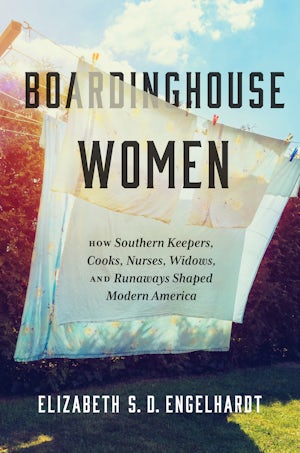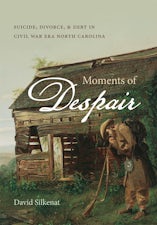Boardinghouse Women
How Southern Keepers, Cooks, Nurses, Widows, and Runaways Shaped Modern America
By Elizabeth S. D. Engelhardt
312 pp., 6.125 x 9.25, notes, bibl., index
-
Paperback ISBN: 978-1-4696-7640-1
Published: November 2023 -
E-book EPUB ISBN: 978-1-4696-7641-8
Published: November 2023 -
Hardcover ISBN: 978-1-4696-7639-5
Published: November 2023
Buy this Book
- Paperback $27.95
- Hardcover $99.00
- E-Book $21.99
For Professors:
Free E-Exam Copies
Engelhardt draws on a vast archive to recover boardinghouse women's stories, revealing what happened in the kitchens, bedrooms, hallways, back stairs, and front porches as well as behind closed doors—legacies still with us today.
About the Author
Elizabeth Engelhardt is Kenan Eminent Professor of Southern Studies at the University of North Carolina at Chapel Hill.
For more information about Elizabeth S. D. Engelhardt, visit
the
Author
Page.
Reviews
"Elizabeth Engelhardt vividly establishes how southern boardinghouses were crucibles and the women who kept them were agents of improvisation, ingenuity, grit, and grits. Her trenchant research and reframing allow us to see these ventures, so often born from a moment of acute personal loss and economic necessity, as the loci not only of tragedy and exigency but also of bodily autonomy, self-expression, financial stability, and even freedom."--Monique Truong, author of The Book of Salt, Bitter in the Mouth, and The Sweetest Fruits
"Carefully researched, beautifully written, and thought provoking. The heretofore unknown stories that Engelhardt narrates will propel readers to learn more about the everyday lives of boardinghouse keepers and those to whom they opened their homes. This book especially allows readers to see Black women and men as property owners, entrepreneurs, and integral to this nation's culinary evolution."--Psyche Williams-Forson, author of Eating While Black: Food Shaming and Race in America
"Black, white, comfortable, poor, straight, gay, male, female—southern boardinghouses had a place for everyone. Engelhardt beautifully illuminates life in these once-ubiquitous houses, which may have blended into the historical background but powerfully shaped the region and nation."—Rebecca Sharpless, author of Grain and Fire: A History of Baking in the American South


